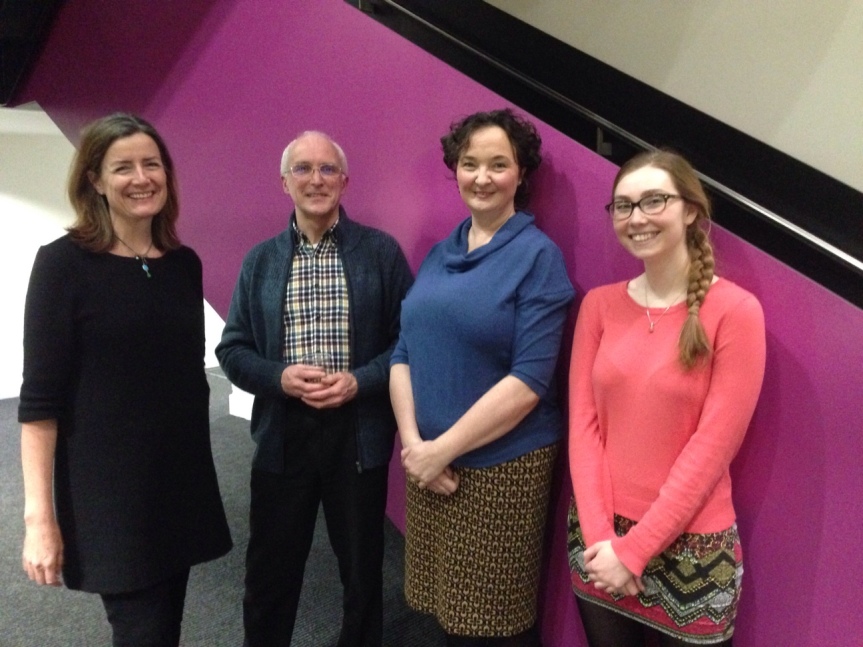
On Tuesday 9th February Jenny Savill – senior agent at Andrew Nurnberg Associates – spoke to a packed classroom of would-be authors eager to improve their chances of getting recognised by an agent.
The talk ranged over a variety of themes like Why have an agent; Taking on an author; Advice for submitters and practical tips on the Manuscript checklist as well as the Story checklist – and great tips on the Synopsis and Covering letter.
All of this was very useful. Some of it you can glean through books but Jenny brought to it the authenticity of experience and the warmth of someone who genuinely loves finding and nurturing new authors. Even as a vegetarian I could appreciate her Steak Story and the 6 lunches it took to restore a young writer’s confidence in himself. If Jenny is reading this I’d just like to point out that vegetarian authors are probably cheaper to mend than carnivores (and did I mention I was a vegetarian?).
The talk itself featured some excellent insights (my notes contained cryptic records of her observations of national differences – no Thrillers in Brazillers or Romance in France) but the question and answer sessions provided very useful insights too. So here’s a selection – questions in bold, answers in plain and grouped under related themes.
Choosing an agent
How do you find out who represents your favourite authors? Go to the author’s web pages to find out.
Do you need to worry about the author / agent relationship if you are likely to move countries? No, so much of the communication is online that geography is unimportant but the commission rate would change.
What if you work in more genres than your agent supports? No problem, you can use different agents for different books.
If you like a submission but already have something similar would you take it on? No, we wouldn’t take on something that competed with our current authors so make sure an agent’s current authors are not too close to you.
The mechanics of submission
If we write with pseudonyms do you want us to make the initial approach using our real names? No worry one way or the other, though if you were taken on it might make the first face-to-face meeting illuminating.
When submitting the first three chapters is there a length guide? No, not really. And don’t be afraid to add a prologue if it’s appropriate and helps set the first three chapters.
Is it a problem if the technical qualities of your writing are a bit unusual (e.g. a non native English speaker or dyslexic)? No. Obviously get it proof read before sending it in and state your circumstances in the covering letter. Jenny is more than happy to work with a really good story even if the spelling or grammar may need some editing.
Is it important to show the character’s development in the synopsis? No, the synopsis is a factual timeline of the main story events.
At what point should we send in? With fiction, you need to have the whole thing finished but non-fiction is ok to send a sample when it is not yet completed since plot is less significant.
Should we try to make MS stand out; e.g. an eye-catching presentation? No, just write a really good cover letter.
Should we mention we’re doing an MA course in submission letter? Yes, it’s an interesting fact that shows you are serious about your craft.
Types of submission
What are your personal preferences? Not high fantasy or proper sci-fi. But likes dual time stories, or speculative fiction with threads of magic.
Do you accept Novellas? Yes. Happy with a wide word range from around 30k to about 100k words. Beware of overlong works – they can be expensive to translate.
Is it ok to have stories containing prologues and epilogues? Yes – I love them; but it’s a taste preference that could vary between agents.
Is there a market for children’s short stories? Yes, increasingly. It works best if there’s an overarching theme for the collection. Not much scope for one offs, but Jenny is keen to see collection possibilities.
Reality check
What % of your applicants are successfully taken on? Jenny gets ~50 submissions a week. Last year she took on three authors. (Jenny didn’t work out the maths but I did. If you assume she works a 40 week year then those three successes were from 50×40 applicants. So about a 1 in 2000 success rate!).
What kind of work sells best internationally? – Often fantasies but it’s not wise to deliberately try to write Euro-friendly stories. Just write the best book you can and get the best agent you can.
In creative non-fiction – do agents help to facilitate research interviews? Sometimes but it’s mainly author’s responsibility
Are more new authors taken on via the slush pile or festivals? It’s a mixture – some from the slush pile, some from festivals and 1:1s and some referred from existing authors etc.
Do you reply to every submission? There’s an auto response message that says if you’ve not heard after 3 months then answer is no. Occasionally if a reject has promise there will be a personal reply but not much more than one a month.
–
In conclusion it was a fascinating evening and we’d like to extend a big thanks to Jenny Savill for making a scary rite of passage look a little less terrifying and helping us feel better equipped for Joseph Campbell’s Hero’s Journey with the tiniest inkling of Booker’s Rags to Riches at the end.
And, of course, a big thanks to Judith for organising the visit.
Post by Alistair McNaught
